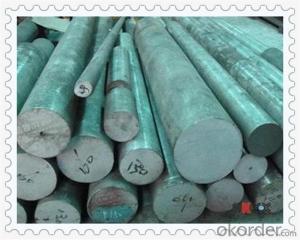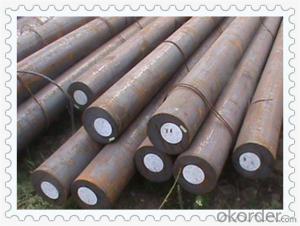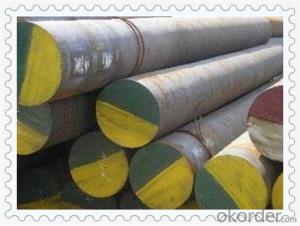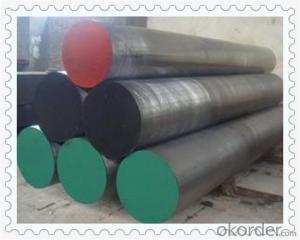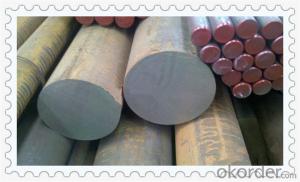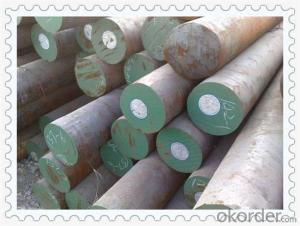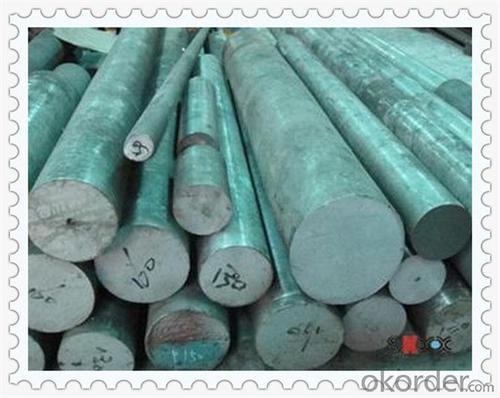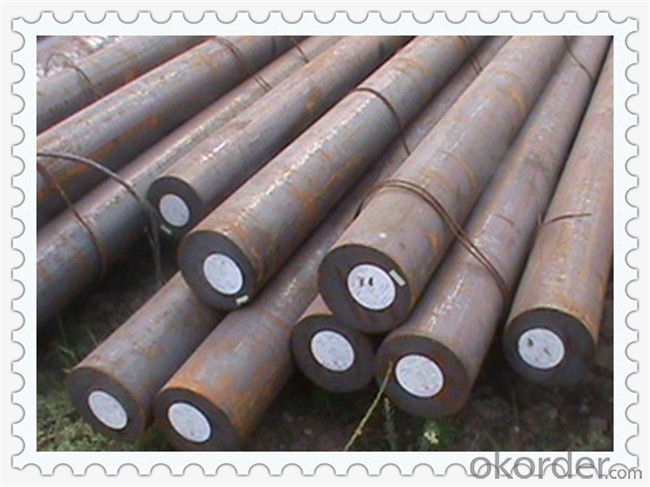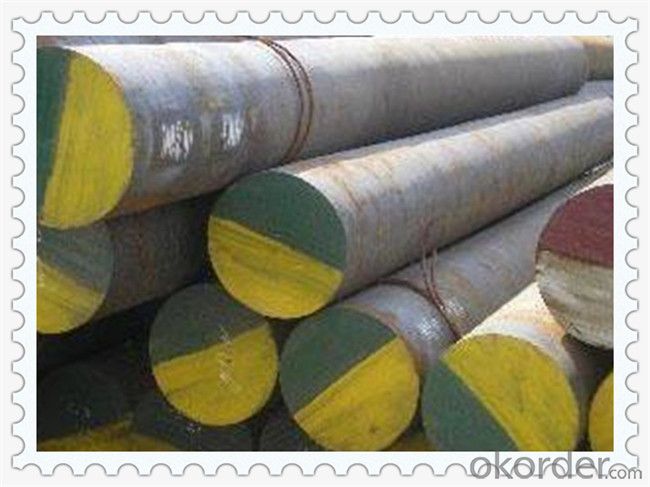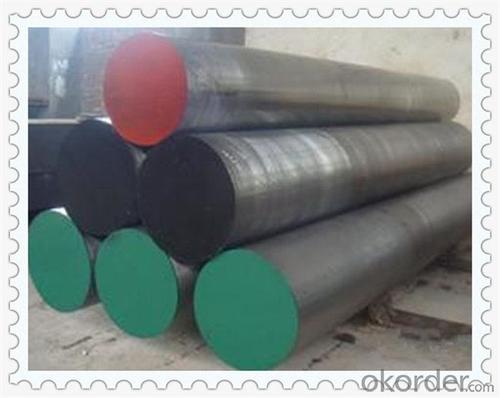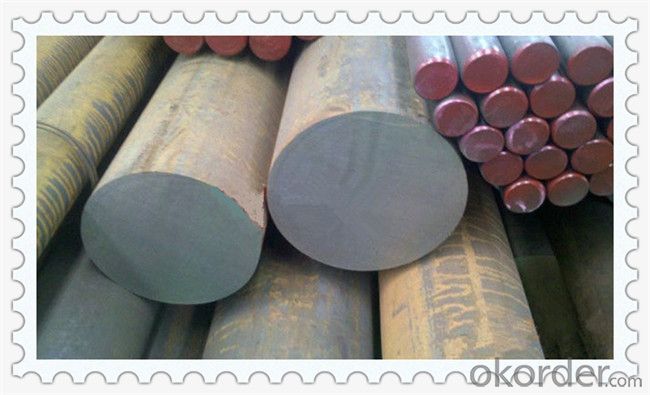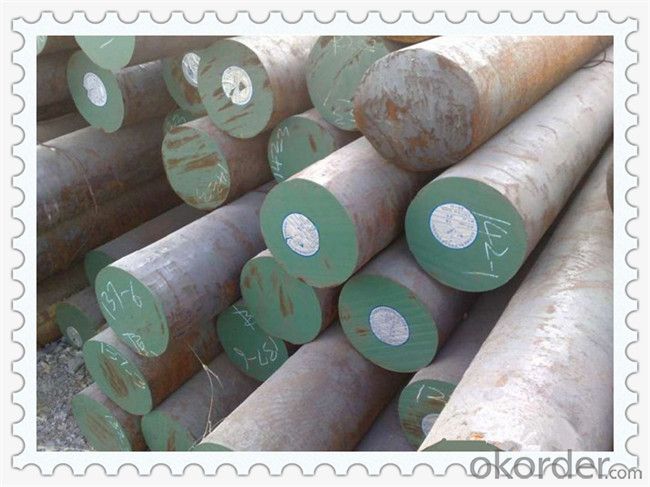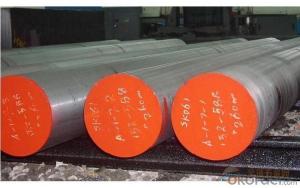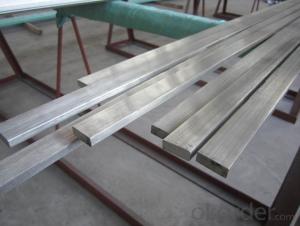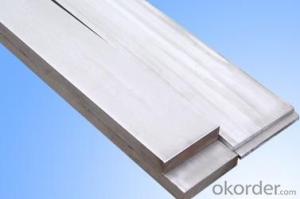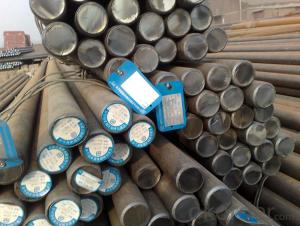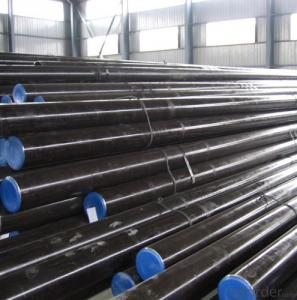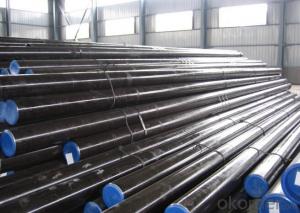Spring Steel Round Bar SUP7 SUP9 SUP10 SUP11 5160H 6150H
- Loading Port:
- China main port
- Payment Terms:
- TT OR LC
- Min Order Qty:
- 30 m.t.
- Supply Capability:
- 10000 m.t./month
OKorder Service Pledge
OKorder Financial Service
You Might Also Like
Spring Steel Round Bar SUP7 SUP9 SUP10 SUP11 5160H 6150H
Products Details
Hot rolled spring steel round bar
Dia: 12mm-300mm
Grade: SUP9 SUP10 SUP11
Quality: ELF+hot rolled
Hot rolled spring steel round bar
Grade | C | Si | Mn | S | P | Cr | B |
55Si7 | 0.42-0.60 | 1.50-2.00 | 0.60-0.90 | Max 0.030 | Max 0.030 | 0.0008-0.0030 | |
60Si7 | 0.57-0.64 | 1.50-2.00 | 0.60-0.90 | Max 0.030 | Max 0.030 | 0.0008-0.0030 | |
60SiCr7 | 0.56-0.64 | 1.60-2.00 | 0.70-1.00 | Max 0.025 | Max 0.025 | 0.20-0.40 | |
55Cr3 | 0.52-0.59 | Max 0.40 | 0.70-1.00 | Max 0.025 | Max 0.025 | 0.70-1.00 |
We can supply you the spring steel (GB standard)
65#, 70#, 85#, 65Mn, 55SiMnVB, 60Si2Mn, 60Si2MnA, 60Si2CrA, 60Si2CrVA, 55SiCrA, 55CrMnA, 60CrMnA, 50CrVA, 60CrMnBA, 30W4Cr2VA
Grade: 55Cr3, 51CrV4, 60Si2Mn4 etc.
DIMENSION
Rounds: Hot rolled dia.11-90mm, Cold drawn dia.5-50mm
Flats: 6-32mm * 44.5-150mm
Delivery condition: EAF+LF+VD, Hot rolled / Cold drawn, Black / Peeled
Application: Auto manufacture, spring wire
With the short stress production line that can finish foundry and rolling in one process, we are able to produce
dozens type of spring flat steel from 6*40mm to 20*150mm.
Products Show
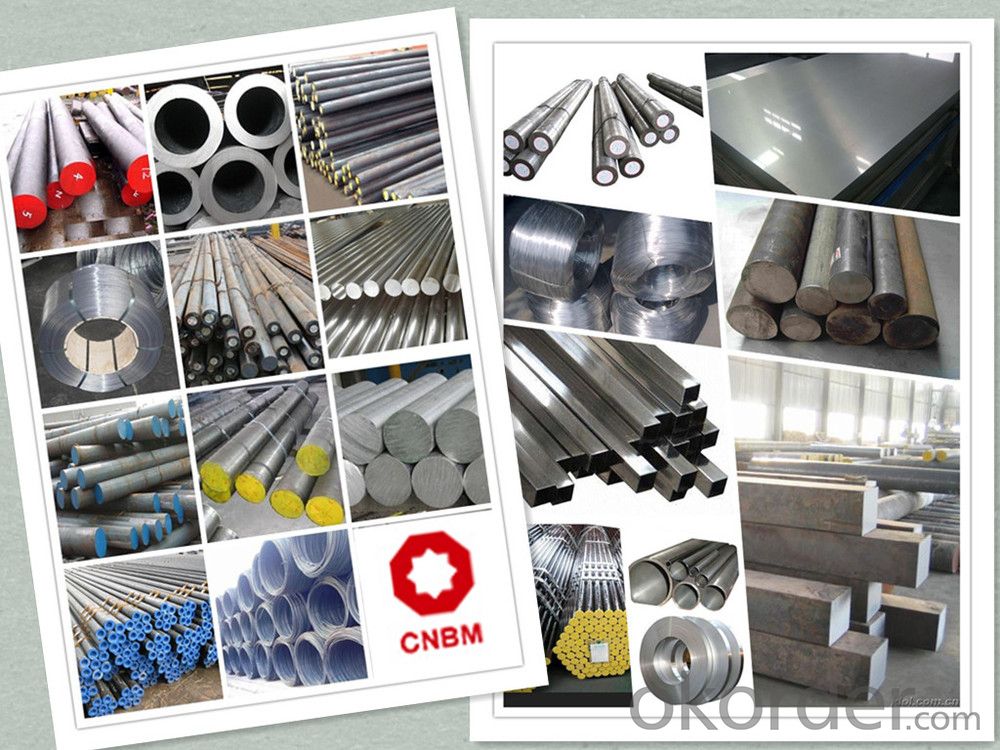
Product Overviews
| Product Name | Typical Grades | Diameter(mm) | Standard adopted |
| Carbon Steel | 20 (1020/S20C/C22) | Ø16-Ø300 |
GB/SAE/JIS/DIN
|
| 40 (1040/S40C/C40) | |||
| 45 (1045/S45C/C45) | |||
| Bearing Steel | GCr9 (51100/SUJ1) | Ø12-Ø250 | |
| GCr15 (52100/SUJ2/100Gr6) | |||
| GCr9SiMn (A485-Gr.1/SUJ3) | |||
Cr-Mo Steel | 20Cr (5120/SCr420H/20Cr4) | Ø12-Ø250 | |
| 40Cr (5140/SCr440/41Cr4) | |||
| 42CrMo(4140/SCM440/42CrMo4) | |||
| Gear Steel | 20CrNiMo | Ø16-Ø600 | |
| 20CrMn(5115/SMnC420/20MnCr5) | |||
| 20CrNiMo(8620/SNCM220/20CrMiMo2) |
Application
| Carbon Steel | Mold bottom, Plastic mold, Construction machinery parts Automobile parts, Security grills, Screens, Construction |
| Bearing Steel | Aerospace, Navigation, Nuclear energy, Chemical industry Electronic information, Petrochemical, Instrument and meter Transportation |
| Cr-Mo Steel | Mechanism & Fasteners gear, Stressed components for vehicles Engines and machines, Parts of larger cross-section |
| Gear Steel | All kinds of gears, Statically and dynamically stressed component for vehicles Engines and machine, Larger cross-section parts, Crankshafts |
Work Shop
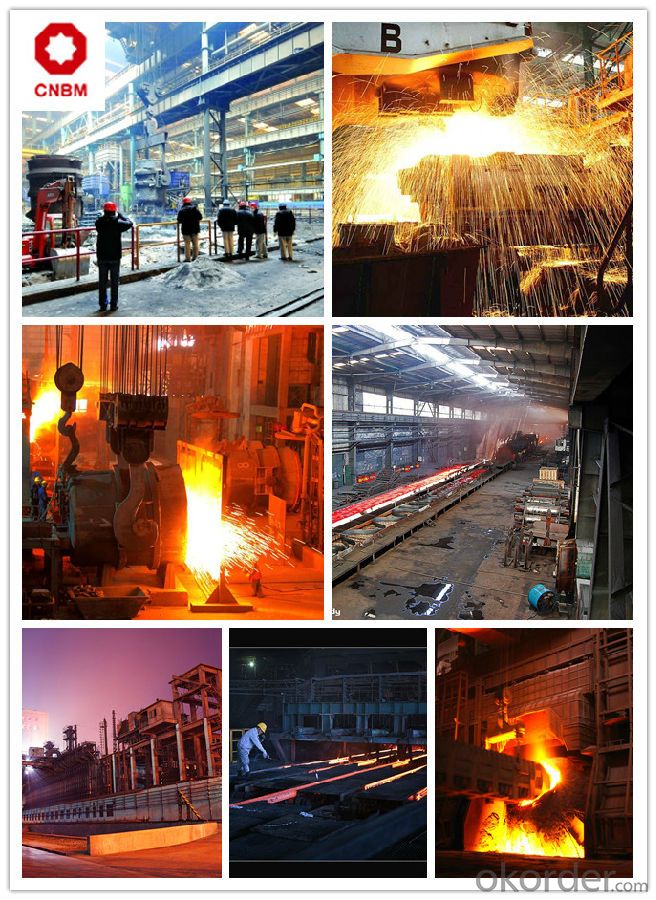
Company Information
CNBM International Corporation is the most important trading platform of CNBM group.
Whith its advantages, CNBM International are mainly concentrate on Cement, Glass, Iron and Steel, Ceramics industries and devotes herself for supplying high qulity series of refractories as well as technical consultancies and logistics solutions.

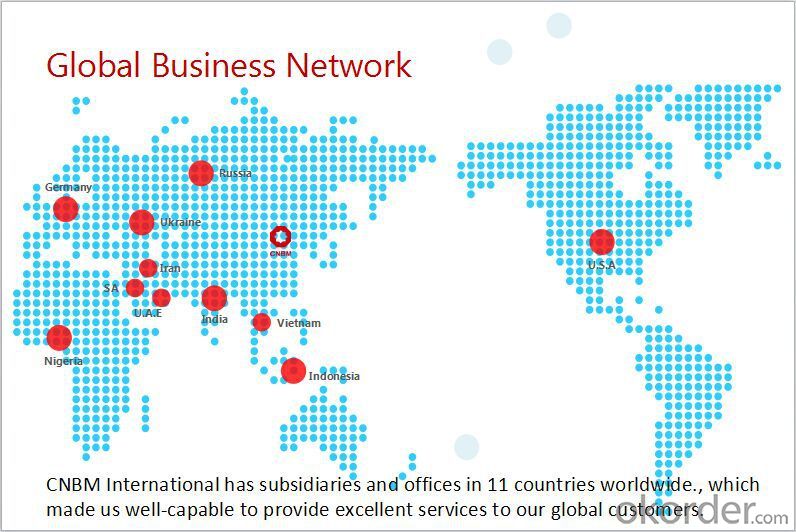
FAQ
1, Your advantages?
professional products inquiry, products knowledge train (for agents), smooth goods delivery, excellent customer solution proposale
2, Test & Certificate?
SGS test is available, customer inspection before shipping is welcome, third party inspection is no problem
3, Factory or Trading Company?
CNBM is a trading company but we have so many protocol factories and CNBM works as a trading department of these factories. Also CNBM is the holding company of many factories.
4, Payment Terms?
30% TT as deposit and 70% before delivery.
Irrevocable L/C at sight.
5, Trading Terms?
EXW, FOB, CIF, FFR, CNF
6, After-sale Service?
CNBM provides the services and support you need for every step of our cooperation. We're the business partner you can trust.
For any problem, please kindly contact us at any your convenient time.
We'll reply you in our first priority within 24 hours.
Packaging & Delivery
1, Packaging: seaworthy package or as required
2, Delivery: 35-45 days or based on quantity
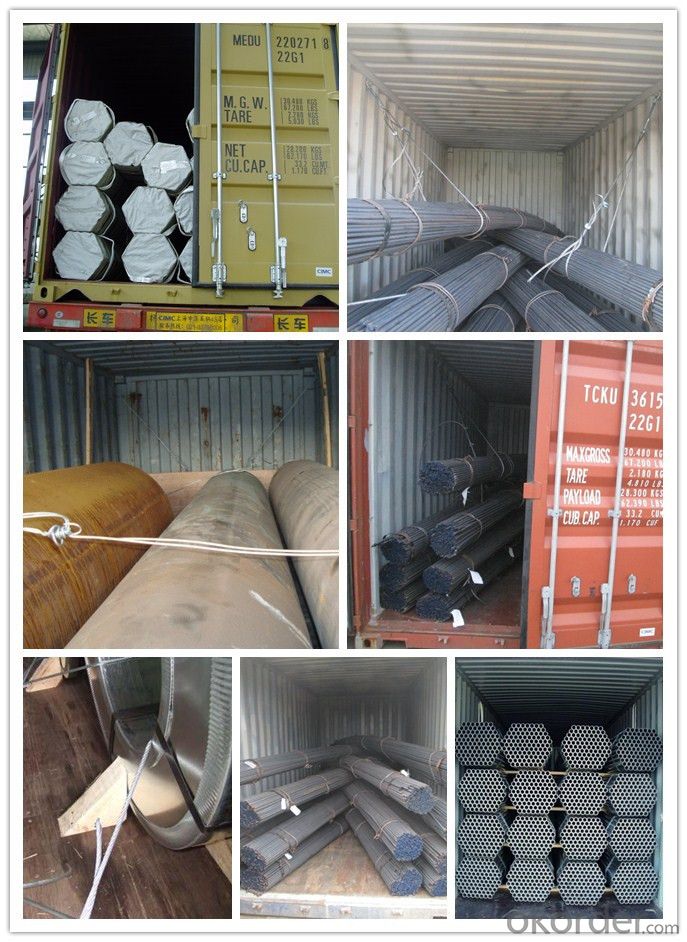
- Q: What are the different types of steel round bar surface coatings?
- Some of the different types of steel round bar surface coatings include galvanized coatings, epoxy coatings, powder coatings, and chrome plating.
- Q: What is the difference between hot rolled and cold drawn steel round bars?
- Hot rolled steel round bars are produced by heating a steel billet or ingot at a high temperature and then rolling it into the desired shape. This process results in a rougher surface finish and a larger diameter tolerance compared to cold drawn steel round bars. Hot rolled bars are commonly used in applications where strength and durability are important, such as in construction and manufacturing. On the other hand, cold drawn steel round bars are produced by pulling a hot rolled bar through a die at room temperature, which results in a smoother surface finish and tighter diameter tolerances. This process also improves the mechanical properties of the steel, such as its strength and hardness. Cold drawn bars are often used in applications where precision and a high-quality surface finish are required, such as in the production of shafts, bolts, and precision components. In summary, the main differences between hot rolled and cold drawn steel round bars are the surface finish, diameter tolerance, and mechanical properties. Hot rolled bars have a rougher surface finish, larger diameter tolerances, and are typically used in applications where strength and durability are important. Cold drawn bars have a smoother surface finish, tighter diameter tolerances, and are commonly used in applications where precision and a high-quality surface finish are required.
- Q: What are the different types of steel round bars used in the automotive engine components?
- There are several types of steel round bars used in automotive engine components, including carbon steel, alloy steel, stainless steel, and tool steel. Each type of steel offers different properties and characteristics that make them suitable for specific engine components, such as crankshafts, camshafts, connecting rods, and valves. Carbon steel is commonly used for its strength and affordability, while alloy steel provides enhanced strength and resistance to wear and tear. Stainless steel offers excellent corrosion resistance, making it suitable for components exposed to high temperatures and harsh environments. Tool steel, on the other hand, is often used for specialized engine components that require high hardness and toughness, such as cutting tools and dies.
- Q: Can steel round bars be welded to other materials?
- Yes, steel round bars can be welded to other materials. The process typically involves using compatible welding techniques and materials, such as specific filler metals, to achieve a strong and durable bond between the steel round bar and the other material.
- Q: Can steel round bars be used for making decorative items?
- Yes, steel round bars can definitely be used for making decorative items. Steel round bars are versatile and can be shaped, bent, and welded to create various decorative designs. They offer durability and strength, making them suitable for both indoor and outdoor applications. Steel round bars can be used to make decorative furniture, sculptures, railings, gates, light fixtures, and much more. Their sleek and modern appearance adds an industrial and contemporary touch to any space. Additionally, steel round bars can be finished with different coatings or treatments, such as powder coating or patina, to enhance their visual appeal and protect them from corrosion. Therefore, steel round bars are an excellent choice for creating decorative items due to their versatility, strength, and ability to add a stylish and unique touch to any design.
- Q: Can steel round bars be used in the aerospace industry?
- Yes, steel round bars can be used in the aerospace industry. Steel round bars are commonly used in various aerospace applications such as structural components, engine parts, landing gear, and fasteners due to their high strength, durability, and resistance to corrosion.
- Q: What are the advantages of using nickel-chromium-titanium alloy steel round bars?
- Some advantages of using nickel-chromium-titanium alloy steel round bars include their high strength and durability, excellent corrosion resistance, and good heat resistance. These alloy steel round bars also offer superior wear resistance and can withstand harsh environments. Additionally, they have good machinability, making them suitable for various applications in industries such as aerospace, automotive, and oil and gas.
- Q: What is the diameter deviation of 12 mm galvanized round bar?
- It is widely used in hardware, building, automobile, shipbuilding, petrochemical, machinery, medicine, food, electricity, energy, aerospace and other architectural decoration. The most extensive machining of general machine parts, general rod type steel parts, CD pole, bolt, nut.
- Q: What are the different types of steel round bar alloys used in the aerospace industry?
- There are several different types of steel round bar alloys that are commonly used in the aerospace industry. These alloys are specifically designed to meet the demanding requirements of the aerospace sector, including high strength, corrosion resistance, and lightweight properties. 1. Stainless Steel: Stainless steel is one of the most popular alloys used in aerospace applications. It offers excellent corrosion resistance, high strength, and good heat resistance. This alloy is commonly used in aircraft components such as landing gear, fasteners, and engine parts. 2. Titanium Alloy: Titanium alloys are widely used in the aerospace industry due to their high strength-to-weight ratio. They offer excellent corrosion resistance, good fatigue strength, and can withstand high temperatures. Titanium alloys are commonly used in aircraft frames, engine components, and landing gear. 3. Aluminum Alloy: Aluminum alloys are lightweight and have good mechanical properties, making them suitable for aerospace applications. They offer good corrosion resistance and are often used in aircraft structures, wings, and fuselage components. 4. Nickel Alloy: Nickel alloys are known for their high strength and excellent resistance to extreme temperatures. They are commonly used in aerospace applications where resistance to heat, wear, and corrosion is critical, such as in turbine engines and exhaust systems. 5. High-Strength Low-Alloy (HSLA) Steel: HSLA steels are known for their high strength and good weldability. They offer good toughness and impact resistance, making them suitable for aerospace applications where strength and durability are essential, such as in landing gear and structural components. Overall, the aerospace industry utilizes a combination of these steel round bar alloys to meet the specific requirements of different components and applications. Each alloy offers unique properties that make it suitable for specific aerospace applications, ensuring the safety, reliability, and performance of aircraft in the highly demanding aerospace environment.
- Q: How do you determine the strength and hardness of a steel round bar?
- To determine the strength and hardness of a steel round bar, several tests and techniques can be employed. One of the most common methods is the tensile strength test. In this test, a sample of the steel round bar is subjected to a gradually increasing load until it reaches its breaking point. The maximum load it can withstand before breaking is recorded, which gives an indication of the bar's strength. Hardness testing is another crucial measure of steel round bar quality. The Rockwell hardness test is frequently used, where a diamond or tungsten carbide ball is pressed into the surface of the bar with a specific load. The depth of the indentation made by the ball is measured, and the hardness value is determined based on a standardized scale. Additionally, the Brinell hardness test can be utilized, where a hardened steel ball is pressed into the surface of the round bar with a specific load. The diameter of the indentation formed is measured, and the hardness is calculated based on the applied load and the size of the indentation. Furthermore, there are non-destructive techniques such as ultrasonic testing and magnetic particle inspection that can provide information about the internal structure, defects, and cracks within the steel round bar, thus indirectly indicating its strength and hardness. It is important to note that various factors, including the composition of the steel, its heat treatment, and the manufacturing process, can influence the strength and hardness of a round bar. Therefore, it is advisable to consult standards and specifications that define the expected properties for the specific type of steel round bar being tested.
Send your message to us
Spring Steel Round Bar SUP7 SUP9 SUP10 SUP11 5160H 6150H
- Loading Port:
- China main port
- Payment Terms:
- TT OR LC
- Min Order Qty:
- 30 m.t.
- Supply Capability:
- 10000 m.t./month
OKorder Service Pledge
OKorder Financial Service
Similar products
Hot products
Hot Searches
Related keywords
